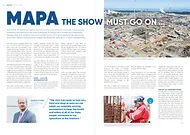ANDRITZ – ON SCHEDULE WITH DELIVERY
ANDRITZ is a major supplier to the MAPA project. The scope of supply to the mill includes a complete wood processing plant, fiberline, black liquor evaporation plant, and complete white liquor plant.
While COVID-19 has had an impact on the overall schedule of the project, deliveries of key equipment continue to take place. At present, civil works are being readied and all areas are moving to the mechanical installation phase. Harri Makkonen, ANDRITZ Project Director for MAPA says, “All purchasing is now complete, and we are on schedule with our delivery. We are now moving towards the site supervision part of the project.
“There have been some effects of COVID-19 hampering our progress, mainly due to ongoing manufacturing delays in China, as well as delays with South American sub-suppliers. We have also experienced some delays in shipping due to ship availability and access blockages at ports abroad, as well as inland transportation because of travel restrictions at origin. However, considering the extent and seriousness of the virus, we are continuing to get things done and we are content with our progress.”






